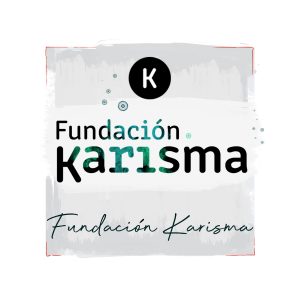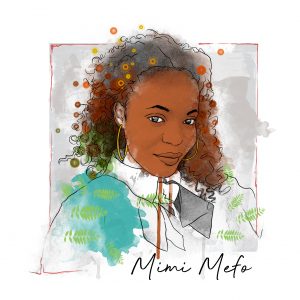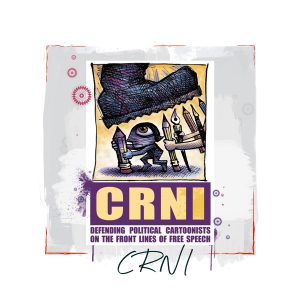4 Apr 2019 | Awards, Fellowship, Fellowship 2019, News and features
[vc_row][vc_column][vc_video link=”https://www.youtube.com/watch?v=sjaKFw-3zlo”][vc_column_text]As an artist, imagine yourself in a city destroyed by war. Can you think about anything other than portraying the destruction you see around you?
“This picture has crossed the line between art and criticism.”
These words belong to the judge who gave me a prison sentence for a picture I painted.
The limits of art, which the artistic world has not been able to agree upon for centuries, have apparently been figured out by the decision of a Turkish court.
It is not only art that has had boundaries drawn around it in Turkey: the things that can be said between friends, the topics you can write about, and the concepts you can debate at school with your students have all been limited by the authorities. And those who reject these limitations find themselves in prison. Journalists who reject these limitations and this “freedom of expression” either lose their jobs, their freedom, or their lives. Women who come out against the repression of the patriarchal order face more difficulties today than ever. The same is true for Kurds who want to express their identities. Kurds who do not fit into the moulds shaped for them by the authorities face house raids, arrests and even death.
Turkey’s prisons are filled with artists, intellectuals and politicians, because we reject these limits forced upon our freedom of expression and we will continue to reject them. There are thousands of prisoners on hunger strike, following the example of member of parliament Leyla Guven. Many are critically ill, please share their story.
Although they are trying to restrict our freedom of expression in the prisons through the books they refuse to give us and the letters they find “suspect”, there are countless inmates who have overcome this situation through their own productivity. I dedicate this prize to them.[/vc_column_text][vc_basic_grid post_type=”post” max_items=”10″ element_width=”6″ grid_id=”vc_gid:1554466636823-9cb9bc90-7b9d-7″ taxonomies=”8935″][/vc_column][/vc_row]
4 Apr 2019 | Awards, Colombia, Digital Freedom, Fellowship, Fellowship 2019, News and features
[vc_row][vc_column][vc_video link=”https://www.youtube.com/watch?v=keuoW49mUy0″][vc_column_text]Carolina Botero Cabrera, executive director of Fundación Karisma, accepted the award on behalf of the organisation.

Good evening. We are honored by today’s recognition, and humbled to be part of such a great group of organizations shortlisted from all over the world. Knowing that we were the Latin American candidate for this award was a great privilege and joy for us in itself. But we are especially grateful to Index on Censorship for the opportunity to speak in front of all of you.
For some years now, in Fundacion Karisma, a women-led organization, we have been reflecting on the need to analyze the experiences of women on the internet. In 2015, we worked with a group of female journalists to distinguish and understand the consequences of online harassment that this group faces, not only on account of their profession, but because they are women.
Our findings show that online harassment is often underestimated, and that its effects are often downplayed. But what worried us most was how much female journalists prefer to opt for self-censorship. And this self-censorship impacts not only the freedom of expression of women, but of society as a whole, because there is less diversity of voices in the public debate.
From this experience, we asked ourselves how to provoke a conversation about gender-based discrimination on the Internet. This is how “Alerta Machitroll” was born.
At the heart of Karisma’s work has always been the promotion of access to knowledge and culture. As you just heard, we worked on the case of Diego Gomez, a young biology student who faced between 4 and 8 years in prison for copyright infringement, for sharing an academic paper on the internet. With our support, Diego’s case ended well and two judges concluded that science is characterized by sharing practices.
Let me emphasize that the Internet is a great tool for freedom of expression. However, its growing prevalence is not always linked to greater freedom of expression for all… Karisma works to show how we can transfer and strengthen offline safeguards into the online world and to increase awareness of these issues.
Repressive and regressive regulation and practices that harm freedom of expression are often in response to fear. In Karisma, however, we aim to draw attention to problems that are important to people like you and me with solutions that strengthen rather than diminish freedom of expression. It is not an easy task, but this award tells us that we are on the right track.Thank you.
Full profile: Colombia’s Fundación Karisma works to enhance digital rights[/vc_column_text][vc_basic_grid post_type=”post” max_items=”10″ style=”load-more” element_width=”6″ grid_id=”vc_gid:1554466702885-d23c3d1b-aded-4″ taxonomies=”8935″][/vc_column][/vc_row]
4 Apr 2019 | Awards, Fellowship, Fellowship 2019, News and features
[vc_row][vc_column][vc_video link=”https://www.youtube.com/watch?v=diIMLPp-ayw”][vc_column_text]
My name is Mimi Mefo Takambou. I hail from the conflict-hit North West region, and from the French-speaking west region of Cameroon.
I have become one of the most persecuted journalists in Cameroon due to my constant reporting on the civil war that has ripped the English-speaking community apart.
The regime there has been using anti-terror and cybercrime laws to intimidate, threaten, and silence the media.
I stopped publishing information on Facebook and my website for several months because of constant threats and intimidation. But I continue to report.
Since 2017, at least 20 journalists have been arrested and jailed in Cameroon for doing their jobs. I call on the government to drop all charges against them.
One of the most challenging moments of my career was in November 2018 when I was arrested, handcuffed and imprisoned for reporting the killing of an American missionary. I was released four days later following unprecedented national and international mobilization.
As we speak, the crisis in Cameroon remains highly under-reported: journalists are not guaranteed safety when travelling to conduct investigations, and access to information is a major problem. A government which imprisons a journalist is weak, scared of being exposed.
But the response from other journalists when I was arrested tells me that others are still prepared to speak out.
So this award is not just for me, but also for others who continue to stand up for press freedom.
It is a reminder that I must continue to work with objectivity and balance and continue to be a voice for the voiceless.
It will also give me more power to advocate for press freedom and for the release of my colleagues in jail.
Thank you for your support.
Full profile: #IndexAwards2019: Mimi Mefo works without fear or favour in Cameroon’s climate of repression and self-censorship[/vc_column_text][vc_basic_grid post_type=”post” max_items=”10″ element_width=”6″ grid_id=”vc_gid:1554466599889-be00baea-53b9-9″ taxonomies=”8935″][/vc_column][/vc_row]
4 Apr 2019 | Artistic Freedom, Awards, Fellowship, Fellowship 2019, News and features
[vc_row][vc_column][vc_video link=”https://www.youtube.com/watch?v=dtbX0d7pO1A”][vc_column_text] Terry Anderson, deputy executive director of Cartoonists Rights Network International, accepted the award on its behalf.
Terry Anderson, deputy executive director of Cartoonists Rights Network International, accepted the award on its behalf.
Ladies and Gentlemen, distinguished judges, new friends at Index on Censorship,
To accept this award and enter into fellowship with you is an honour intensified by the stature of the other nominees and recipients. On behalf of the CRNI board of directors and our regional reps around the world, thank you.
Those of us concerned with freedom of expression care about cartoonists because we are a societal safety-valve, expressing dissatisfaction about all the injustices and irritants of the world bluntly yet harmlessly, communicating an idea that is consumed in a matter of seconds. This immediacy gives cartoons their sensation of impudence. They are opinion pieces, not reportage. Nonetheless humour falls flat without veracity. Thus we look to cartoonists not for nuanced analysis of policy but to reveal deeper truths and it is for this reason that those in power have cause to fear them. Like virtually no other profession the cartoonist makes it their business to remind the citizenry that the emperor is naked. If they are not safe to say so, we are all diminished.
CRNI has at times had to make do with a skeleton crew and empty coffers even while trying to assist vulnerable practitioners on the other side of the planet and contend with the rising tide of authoritarianism and extremism well-understood by all rights defenders. To receive a plaudit is pleasant indeed, but for us the real prize is a year of fellowship that we hope will prove transformative to our profile and capacity.
I would like to mention some names. Two of our own award-winning cartoonists are with us: Zunar, a political cartoonist who faced 43 years in prison for criticising the Malaysian government, and Eaten Fish, an Iranian cartoonist who spent four years in a refugee detention camp – please do talk to them both this evening and hear their stories.
Two of our most important allies, the UK’s Professional Cartoonists’ Organisation & the International Cities of Refuge Network are represented, thank you. This fellowship recognises CRNI’s campaigning in particular and if we have had any success in this regard it’s due to the tireless efforts of our comms officer Patricia Bargh who stepped down last year. Finally I want to extend thanks on behalf of our founder director Dr Robert Russell who cannot cross the miles between us but rest assured will have the award hand-delivered as soon as possible.
Full profile: Cartoonists Rights Network International defends cartoonists worldwide[/vc_column_text][vc_basic_grid post_type=”post” max_items=”10″ element_width=”6″ grid_id=”vc_gid:1554466528428-22ad1975-324c-9″ taxonomies=”8935″][/vc_column][/vc_row]



 Terry Anderson, deputy executive director of Cartoonists Rights Network International, accepted the award on its behalf.
Terry Anderson, deputy executive director of Cartoonists Rights Network International, accepted the award on its behalf.